Sanders' supporters are increasingly admitting defeat, but Clinton's lead over Sanders is still narrowing
Democratic frontrunner Hillary Clinton’s victories on April 26 clearly moved her ever closer to locking up the party’s presidential nomination, but there is some evidence in the latest Economist/YouGov Poll that she has work to do to gain the support of many of those voters who currently prefer her opponent, Vermont Senator Bernie Sanders.
The long campaign, and the ongoing criticisms from Sanders and his supporters, has cut into Clinton’s lead with Democratic primary voters. Her national double digit lead in preference has shrunk in this poll to only four points.
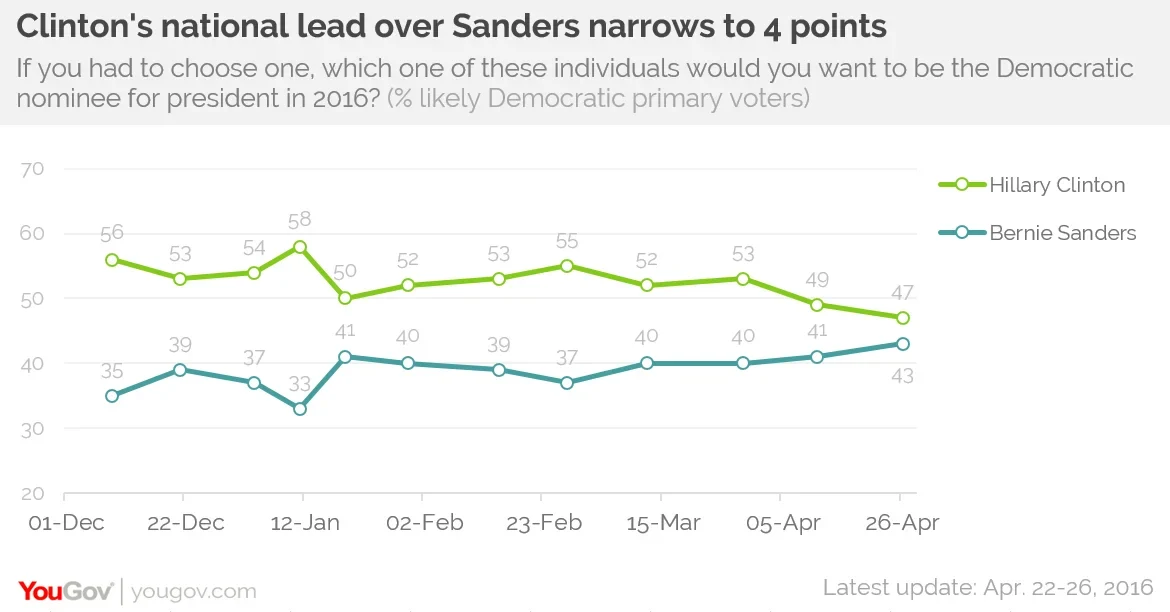
About one in four likely Democratic primary voters do not describe themselves as Democrats (they are independents or Republicans). Since last November, Clinton has held on to the vote of about six in ten Democratic identifiers who are likely primary or caucus voters; Sanders has held on to six in ten of Democratic primary voters who don’t call themselves Democrats.
But Sanders voters’ opinions of Clinton have changed dramatically. Last November, more than six in ten had a favorable view of Clinton; in this poll, just 44% do.
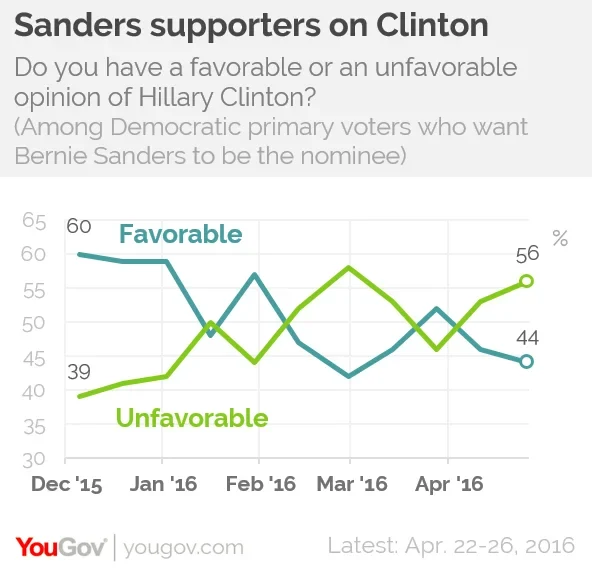
Democrats who are supporting Sanders retain a favorable image of her, though it has dropped from 74% in November. Independents and Republicans supporting Sanders started out barely positive towards Clinton; they are now decidedly negative.
The independent and GOP Sanders supporters are most dissatisfied with the current prospects. 61% of them claim they will be “upset” if Clinton wins the nomination. That bothers only one in four Democratic Sanders voters.
But a Clinton nomination seems more and more inevitable, even to Sanders voters. The poll was conducted prior to Clinton four Northeast wins on April 26, but after her big victory in New York. Prior to that win, just 40% of Sanders supporters thought Clinton would be the party’s nominee; now a majority does.
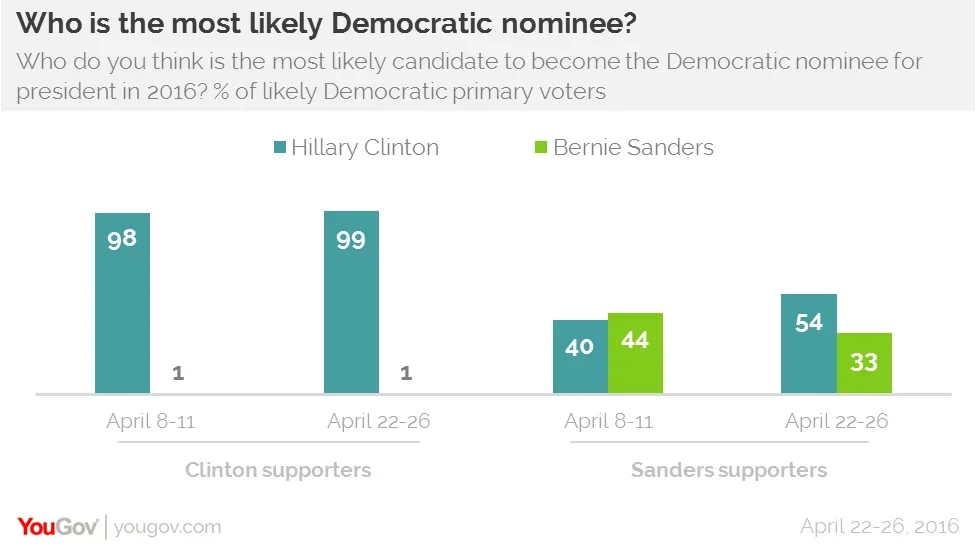
Democratic voters expect that one candidate will sew up the nomination before the party convention in July, although as many Sanders supporters say they think there will be an open convention as think there will be a winner beforehand. (Clinton supporters appear to be getting increasingly impatient: 44% of them think Sanders should drop out, up seven points from before her New York win. 42% think he should stay in.)
If there is an open convention, 41% of Sanders voters think the candidate who has received the most votes should be nominated: that is Clinton, although one in five Sanders supporters believe the Sanders vote total is larger than Clinton’s. But one in four Sanders voters say that the person who would fare best in the general election should be nominated.
For Sanders voters, that would be the Senator from Vermont. Although eight in ten Sanders supporters say Clinton could win the general election, a majority think Sanders would do better. So does their candidate, who has been citing polls indicating he currently does better than Clinton against Donald Trump. However, polls conducted this far ahead of a general election, even before a candidate has been selected, can be deceiving. In April and May, 1988, for example, polls gave Michael Dukakis a healthy lead over then-Vice President George Bush. Dukakis lost that election by nearly eight points.
Will Sanders supporters vote for Clinton? Many have a negative perception of her. And although Clinton has recently toned down any attacks on her Democratic opponent, focusing instead on the leading GOP candidate, Donald Trump, just about half of Sanders voters say Clinton has spent more time attacking Sanders than saying what she will do if elected President. More than half of Clinton voters say that is what Sanders is doing.
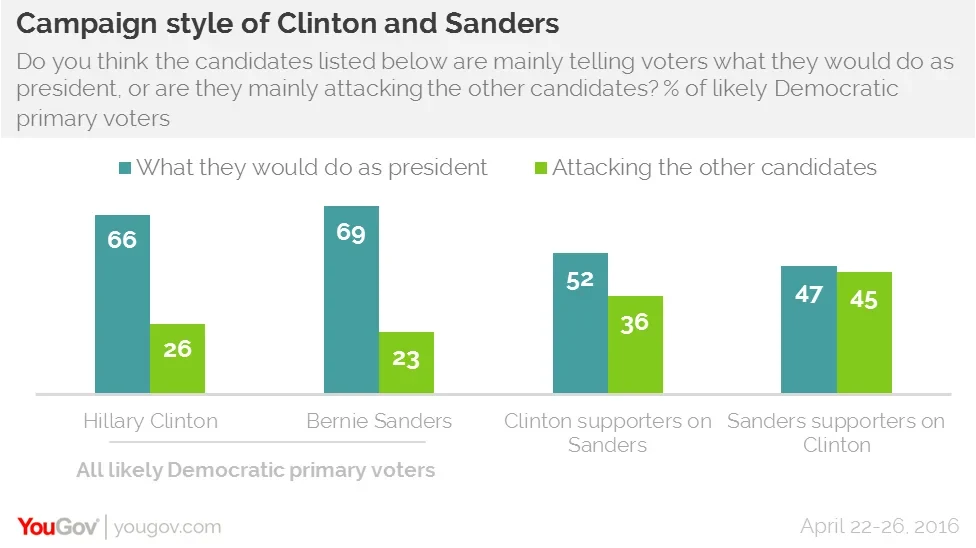
As of now, only 54% of Sanders voters say they would vote Democratic if Sanders doesn’t win the nomination. But when asked about a head-to-head race between Clinton and Donald Trump, nearly two-thirds of them say they would vote for Clinton (higher than the current support Republican primary voters who favor trailing candidates Ted Cruz and John Kasich give to Trump).
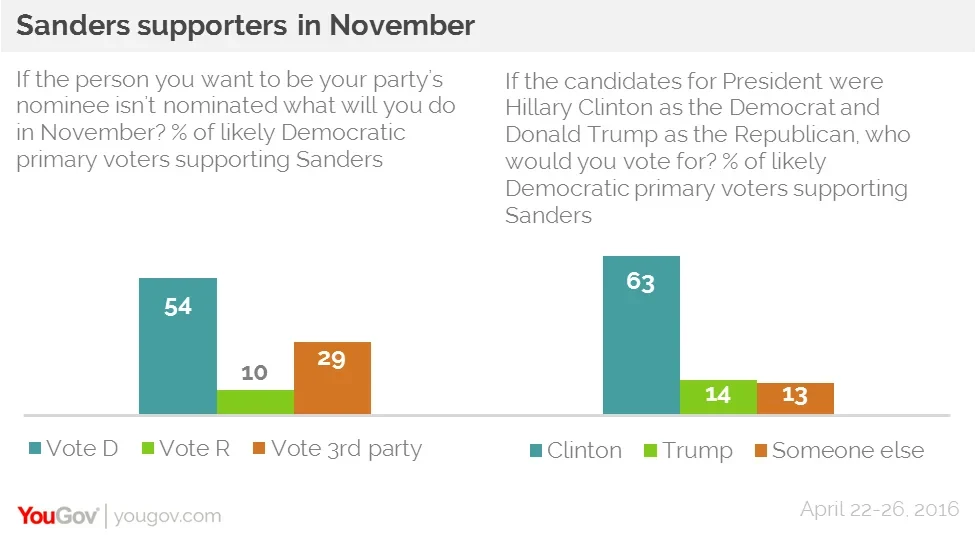
Again, it is the non-Democratic identifiers who support Sanders who are currently the most unwilling to move towards Clinton in a race against Trump. 74% of Sanders Democratic voters would vote for Clinton against Trump. But only 45% of those who don’t think of themselves as Democrats would now move to Clinton.
The bigger issue could be how much help the Vermont Senator gives to a Clinton campaign. His supporters are clearly looking for something in return: more half don’t think he should help Clinton unless she meets some of his conditions or don’t think he should help her at all.
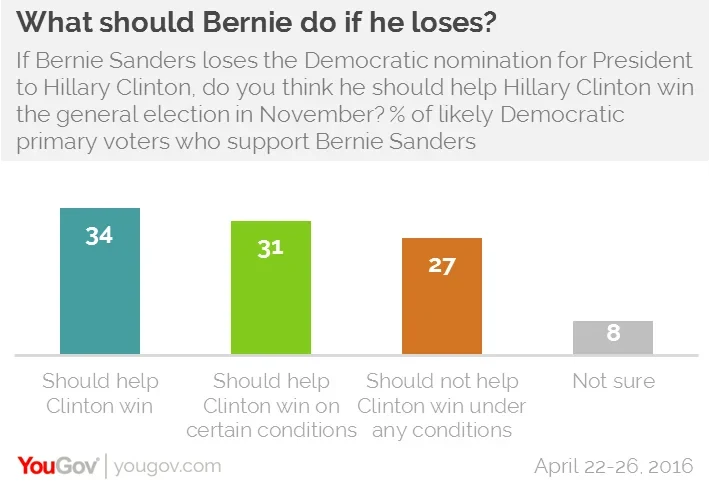
See the Economist/YouGov results
Economist/YouGov poll archives can be found here.










